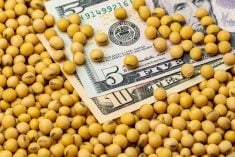MarketsFarm — A strong U.S. dollar and China’s prolonged battle with African swine fever have turned Chicago Board of Trade markets largely bearish.
“We’re seeing a slew of positive [economic] news out of the U.S., and a rallying dollar that has been strong for four out of five sessions,” said Terry Reilly, a grains analyst with Futures International in Chicago.
“That’s a negative indicator for U.S. exports, and puts pressure on commodity prices.”
South America’s larger-than-expected corn and bean crops are weighing on prices, along with China’s continued struggle with African swine fever, which has reduced global demand for protein meal.
Read Also

China to buy 12 million metric tons of soybeans this season, Bessent says
U.S. Treasury Secretary Scott Bessent said on Thursday that China has agreed to buy 12 million metric tons of American soybeans during the current season through January and has committed to buying 25 million tons annually for the next three years as part of a larger trade agreement with Beijing.
“Corn is getting incredibly cheap here,” Reilly remarked.
He predicted July corn contracts could trade down to the $3.40-$3.45 per bushel range, while July bean contracts could test contract lows around $8.60-$8.65 per bushel (all figures US$).
Though flooding conditions will inevitably delay seeding, improving weather conditions in the U.S. Midwest have also put pressure on prices.
“We continue to see fresh contract lows in Kansas City and Minneapolis [wheat] because of improving weather,” said Reilly.
However, North Dakota may see fewer [spring wheat] acres seeded than the U.S. Department of Agriculture originally reported in March, thanks to prolonged wet weather.
“That might be underpinning Minneapolis contracts against Kansas City and Chicago. We’ll be watching headlines for updates in weather models.”
— Marlo Glass writes for MarketsFarm, a Glacier FarmMedia division specializing in grain and commodity market analysis and reporting.











